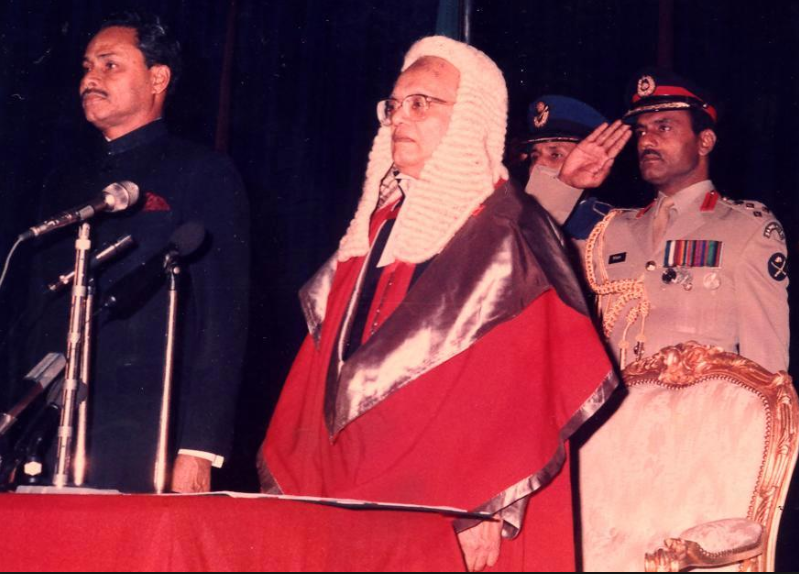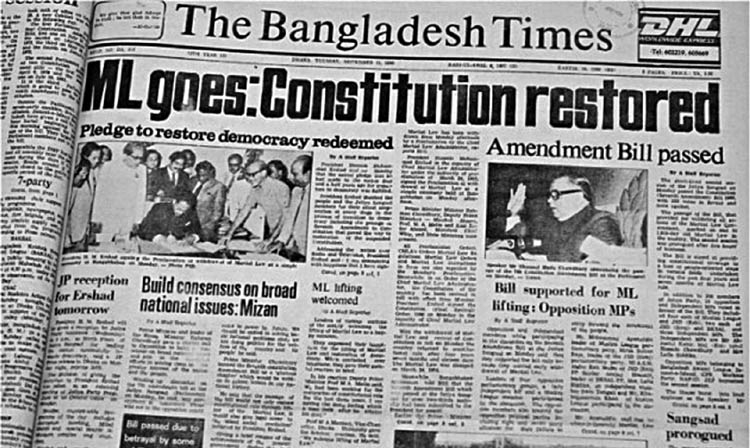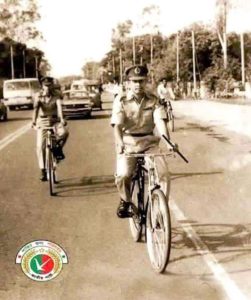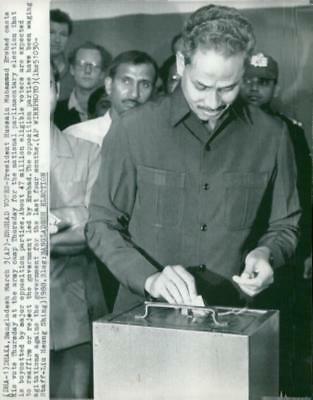Ershad: Rise and fall as dictator and rebirth as politician
A glimpse of HM Ershad's journey as dictator and politician. His rise and fall as a dictator and rebirth as a politician has made him a unique character.

General Ershad cannot be compared with other military dictators of the modern history of world politics.
His rise and fall as a dictator and rebirth as a politician has made him a unique character.
HM Ershad was forced to step down from presidency three decades ago, paving the way for restoration of democracy in the country. But, he was the leader of the opposition in parliament with the status of a minister until he took his last breath on July 14 morning.
During the last term of the Awami League, Ershad was made special envoy to the prime minister and was given the status of a full minister.
Jatiya Party Chairman, also a former president, Hussain Muhammad Ershad was born in the Koochbihar district of West Bengal in 1930.
He completed his graduation from the University of Dhaka in 1950 and was commissioned into Pakistan Army in 1952 from Officers Training School in Kohat, Pakistan. Later, he served as an adjutant in Chattogram’s East Bengal Regiment.
During the Liberation War, he was held as a prisoner of war along with other Bangali officers in West Pakistan. He was repatriated to the new nation of Bangladesh in 1973 in accordance with the Simla Agreement between India's Indira Gandhi and Pakistan's Zulfikar Ali Bhutto.
Rise as a Dictator
After the independence of Bangladesh, Ershad was appointed as the adjutant general of the Bangladesh Army by the then president Bangabandhu Sheikh Mujibur Rahman.

After the assassination of Sheikh Mujibur Rahman, Ershad won the trust of President Ziaur Rahman as he helped calm the turbulent political situation at that time. Zia appointed Ershad as the deputy chief of army staff in 1975.
After the assassination of Ziaur Rahman on May 30, 1981, vice-president Abdus Sattar took over power as acting president.
Though initially Ershad extended his support to the acting president Sattar, later on March 24, 1982, he seized state power, overthrowing Abdus Sattar in a military coup, and imposed martial law.

Ershad declared himself the chief martial law administrator (CMLA), suspended the constitution – the supreme law of the country, dissolved parliament and the council of ministers appointed by Sattar.
Ershad also proclaimed himself commander-in-chief of the armed forces – a constitutional position always held by an elected president.
Fall of a Dictator
Ershad formed the Jatiya Party on January 1, 1986. Soon he declared a general election, which was boycotted by the two main opposition parties of the country – the Awami League and the BNP. Despite allegations of voting fraud and malpractices, Ershad was elected as president on October 15, 1986.
However, Ershad dissolved parliament in 1987 due to the increasing mass demonstrations on the streets mobilised by both the BNP and the Awami League.
Students across the country launched an intensifying movement against Ershad, which ultimately forced him to step down on December 6, 1990.
Later, he was placed under house arrest while he awaited trial on corruption and other charges. At his trial next year, he was found guilty of corruption and illegal weapons possession, and was sentenced to 20 years in prison.
Rebirth as a Politician
Ershad contested the 1996 general elections from jail and still won all five different constituencies he had contested from in 1991.
In 1996, he rendered support to the Awami League and helped form a government of consensus although his party sat on the opposition side of the parliament.
 Ershad was released from jail on January 9, 1997 by the government, but only after he had provided unconditional support to the Awami League.
Ershad was released from jail on January 9, 1997 by the government, but only after he had provided unconditional support to the Awami League.
He was convicted in a corruption case on November 20, 2000 and was released on bail on April 9, 2001 after serving four months in jail in Dhaka. As a result, he could not contest the 2001 elections.
On April 8, 2008, Ershad took charge of his Jatiya Party once again.
Ershad contested the 2008 general elections from three constituencies – Rangpur-3, Kurigram-2 and Dhaka-17 – and won in all three.
Ershad joined the 4-Party Alliance at the end of the BNP’s 2001-06 term after meetings with Tarique Rahman and Lutfozzaman Babar at Ershad’s residence, which was followed by a meeting with Khaleda Zia at her Cantonment residence.
 In late October 2006, Ershad said he was not any more with the 4-Party Alliance, but the following day he reversed his position. Later, he went into hiding for three days and joined the Grand Alliance at Paltan Maidan with Sheikh Hasina.
In late October 2006, Ershad said he was not any more with the 4-Party Alliance, but the following day he reversed his position. Later, he went into hiding for three days and joined the Grand Alliance at Paltan Maidan with Sheikh Hasina.
Ershad was reportedly offered the position of the head of the government in 1991 by Sheikh Hasina when he was in jail and by Khaleda Zia in 1996 before the Awami League formed government after 21 years.
After the 2014 election, Ershad became the special envoy of Prime Minister Sheikh Hasina. Jatiya Party became the opposition party in parliament and Rowshan Ershad, Ershad's wife, became the leader of the opposition. Three Jatiya Party leaders were included in the 49 member- council of ministers while the party acted as opposition party in the Parliament at the same time.
On December 28, 2018, Ershad announced that Jatiya Party candidates contesting from “open seats” would support the ruling Awami League-led grand alliance candidates and extended his support to Sheikh Hasina. His party is now the main opposition in parliament.


 Keep updated, follow The Business Standard's Google news channel
Keep updated, follow The Business Standard's Google news channel
















